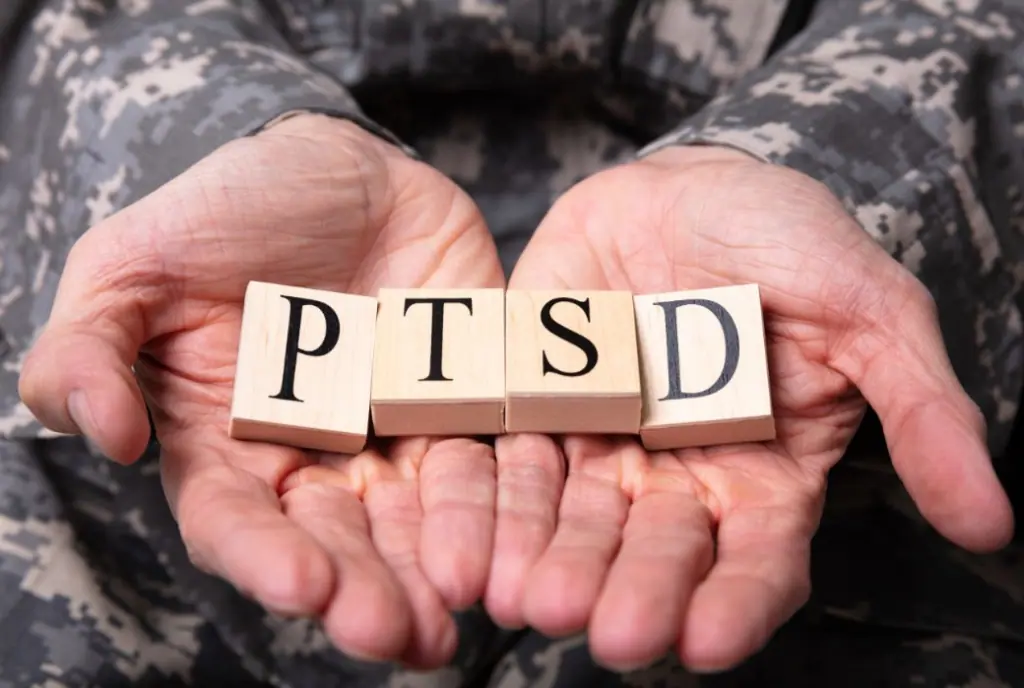The relationship between PTSD and substance abuse is complex and bidirectional. Individuals with PTSD may self-medicate with substances to alleviate symptoms such as anxiety, depression, and intrusive thoughts. However, a substance use disorder can exacerbate PTSD symptoms and impair the ability to manage the disorder effectively. Additionally, individuals with substance use disorders may be more vulnerable to experiencing traumatic events, which can lead to the development of PTSD.
Studies have shown that the co-occurrence of PTSD and substance use disorders is prevalent, with estimates ranging from 20% to 50% of individuals with PTSD also struggling with a substance use disorder. This highlights the importance of addressing both conditions simultaneously in treatment to achieve optimal outcomes and prevent relapse.
PTSD Symptoms
- Intrusive Thoughts: Individuals may experience disturbing memories, intrusive thoughts, or nightmares related to the traumatic event.
- Avoidance Behaviors: They might avoid people, places, or activities that trigger memories of the trauma.
- Negative Changes in Mood and Thoughts: This can include feelings of guilt, detachment, or diminished interest in previously enjoyed activities.
- Hyperarousal Symptoms: These symptoms include difficulty sleeping, irritability, difficulty concentrating, and an exaggerated startle response.
- Physical Symptoms: Individuals may also experience headaches, muscle tension, or gastrointestinal issues.
The severity and duration of PTSD symptoms can vary, with some individuals developing symptoms immediately after the traumatic event, while others may develop them months or even years later. Seeking professional help for proper PTSD diagnosis and treatment is essential.

What is Post-Traumatic Stress Disorder?
Post-traumatic stress disorder (PTSD) is a mental health condition triggered by a terrifying event. Individuals with PTSD often experience disturbing thoughts and feelings related to their traumatic experience that persist long after the event. Symptoms may include flashbacks, nightmares, severe anxiety, and uncontrollable thoughts about the traumatic event.
Causes of Post-Traumatic Stress Disorder
PTSD can develop after exposure to actual or threatened death, serious injury, or sexual violence. Traumatic events that may lead to PTSD include combat exposure, childhood abuse, sexual assault, accidents, or natural disasters. The risk of developing PTSD depends on the intensity and duration of the trauma, personal history, and available support systems.
Coping Strategies for PTSD
Effective treatment for PTSD often involves psychotherapy, medication, or a combination of both. Psychotherapy, such as cognitive processing therapy, can help individuals process the traumatic event and manage symptoms. Medications like antidepressants may help control specific symptoms like sadness, worry, or depression. Support groups and lifestyle changes can also aid in coping with PTSD.
PTSD Symptoms and Treatment for Military and Veterans
Post-traumatic stress disorder (PTSD) is a mental health condition that can develop after individuals experience traumatic events. Recognizing PTSD symptoms is crucial for seeking appropriate treatment and support.
PTSD in Military and Veterans: Military personnel and veterans often face PTSD due to traumatic events encountered during their service. This can lead to comorbid PTSD and substance use disorders (SUD), including alcohol abuse. Addressing both PTSD and SUD is critical for effective treatment and recovery.
Treatment Options:
- Inpatient or Residential Programs: These provide a structured environment for comprehensive care, including individual and group therapy, medication-assisted treatment, and support for co-occurring mental health disorders.
- Outpatient Programs: These offer flexibility for individuals who cannot commit to inpatient treatment, allowing them to receive therapy, counseling, and support while maintaining their daily routines.
- Evidence-Based Therapies: Effective approaches include cognitive-behavioral therapy, prolonged exposure therapy, and motivational interviewing, which aim to address underlying trauma, develop healthy coping mechanisms, and promote long-term recovery from both PTSD and SUD.
Specialized programs tailored to military and veteran populations may also incorporate family therapy and support services to address the impact of PTSD and substance use on relationships and overall well-being. Collaboration between mental health professionals, addiction treatment specialists, and military support organizations enhances the effectiveness of treatment.
Support from the Department of Veterans Affairs (VA): The VA offers a range of services and resources for veterans struggling with PTSD and substance use disorders. These include specialized treatment programs, support groups, and access to mental health professionals experienced in working with military populations. Seeking help through the VA can provide veterans with the necessary tools and support to overcome the challenges of co-occurring PTSD and substance use disorders.
Drug Abuse and Co-occurring PTSD
Individuals who experience post-traumatic stress disorder (PTSD) often struggle with substance abuse. Alcohol or drug abuse and PTSD frequently co-occur, with each condition exacerbating the other. Individuals may turn to substances as a coping mechanism to alleviate PTSD symptoms, while substance abuse can also increase the risk of developing PTSD. This cycle can lead to a complex and challenging situation.
Treating co-occurring PTSD and substance abuse requires a comprehensive approach. Inpatient programs, residential treatment, and outpatient programs offer specialized care for individuals with dual diagnoses. These programs integrate evidence-based therapies, such as individual counseling, group therapy, family therapy, and medication-assisted treatment, to address both conditions simultaneously.
Addiction treatment centers with expertise in co-occurring disorders provide a safe and supportive environment for individuals to work through their trauma and substance abuse issues. Therapies like motivational interviewing and cognitive-behavioral therapy can help individuals develop coping strategies and address the underlying causes of their substance abuse and PTSD.
It is crucial to seek professional help from qualified mental health professionals and addiction specialists. Addressing both PTSD and substance abuse concurrently increases the chances of successful recovery and long-term sobriety. With the right treatment approach and support, individuals can overcome the challenges of co-occurring PTSD and substance abuse.

Prevalence of Co-occurring PTSD and Substance Abuse
Research has consistently shown a high prevalence of co-occurring PTSD and substance use disorders. Studies estimate that approximately 20% to 50% of individuals with PTSD also struggle with substance abuse. Similarly, individuals with substance use disorders have a higher likelihood of experiencing traumatic events and developing PTSD compared to the general population.
The National Comorbidity Survey, a large-scale study conducted in the United States, found that individuals with PTSD were 2 to 4 times more likely to have a co-occurring substance use disorder compared to those without PTSD. This highlights the significant overlap between these two conditions and the need for integrated treatment approaches that address both PTSD and substance abuse simultaneously.
Integrated Treatment for Co-occurring PTSD and Substance Abuse
Integrated treatment models have been developed to address the unique challenges of co-occurring PTSD and substance abuse. These models recognize the interplay between the two conditions and aim to provide comprehensive care that targets both disorders concurrently.
One such integrated treatment approach is Seeking Safety, a present-focused therapy that focuses on developing coping skills, enhancing safety, and promoting self-care. Seeking Safety addresses both PTSD and substance abuse by teaching individuals strategies to manage symptoms, build healthy relationships, and prevent relapse.
Another evidence-based treatment for co-occurring PTSD and substance use disorder is integrated exposure-based therapy. This approach combines prolonged exposure therapy for PTSD with cognitive-behavioral therapy for substance abuse. By addressing the underlying trauma and substance use simultaneously, integrated exposure-based therapy aims to reduce PTSD symptoms and promote abstinence from substances.
Pharmacotherapy may also play a role in the treatment of co-occurring PTSD and substance abuse. Medications such as selective serotonin reuptake inhibitors (SSRIs) are effective in reducing PTSD symptoms, while medication-assisted treatment (MAT) can help manage withdrawal symptoms and cravings associated with substance abuse.
Integrated treatment for co-occurring PTSD and substance abuse requires a multidisciplinary team approach involving mental health professionals, addiction specialists, and other healthcare providers. By collaborating and providing comprehensive care, these teams can help individuals achieve lasting recovery and improve their overall quality of life.
Addiction and PTSD Treatment
Individuals struggling with posttraumatic stress disorder (PTSD) and substance abuse often require specialized treatment to address both conditions simultaneously. A comprehensive approach combining evidence-based therapies and support services can help individuals achieve long-term recovery. Treatment options may include inpatient or outpatient programs, medication-assisted treatment, individual and group counseling, and family therapy.
Inpatient or residential treatment programs provide a structured environment where individuals can focus solely on their recovery. These programs offer intensive therapy, counseling, and support services to help individuals develop coping strategies and address underlying issues contributing to their PTSD and substance abuse. Outpatient programs allow individuals to receive treatment while continuing to live at home, providing flexibility and support through regular therapy sessions and group meetings.
Medication-assisted treatment can be an effective component of a comprehensive treatment plan, particularly for individuals struggling with alcohol or opioid addiction. Medications like naltrexone, buprenorphine, or methadone can help reduce cravings and withdrawal symptoms, increasing the chances of successful recovery. However, medication should be combined with behavioral therapies and counseling for optimal results.
Individual counseling and therapy sessions provide a safe space for individuals to explore their experiences, emotions, and thought patterns related to PTSD and addiction. Therapists may utilize evidence-based approaches like cognitive-behavioral therapy (CBT) or eye movement desensitization and reprocessing (EMDR) to help individuals develop healthy coping mechanisms and process traumatic memories.
Group therapy and support groups offer a sense of community and shared understanding, allowing individuals to connect with others facing similar challenges. These sessions can provide valuable peer support, education, and opportunities to practice new skills learned in individual therapy. Family therapy can also be beneficial, helping to address relationship dynamics and provide support systems for individuals in recovery.
Treating co-occurring PTSD and substance abuse requires a comprehensive and individualized approach that addresses the unique needs and circumstances of each person. By combining evidence-based therapies, medication-assisted treatment, and support services, individuals can develop the tools and strategies necessary for long-term recovery and improved quality of life.
Importance of Trauma-Informed Care
When treating individuals with co-occurring PTSD and substance abuse, it is crucial to adopt a trauma-informed approach to care. Trauma-informed care recognizes the pervasive impact of trauma on an individual’s life and seeks to create a safe, supportive, and empowering environment for healing.
Trauma-informed care involves understanding the connection between trauma, PTSD, and substance abuse. It acknowledges that substance dependence may be a coping mechanism for managing the distressing symptoms of PTSD. By addressing the underlying trauma and providing a non-judgmental and compassionate approach, trauma-informed care can help individuals feel more comfortable and engaged in treatment.
Key principles of trauma-informed care include ensuring physical and emotional safety, promoting trust and transparency, providing opportunities for choice and collaboration, and empowering individuals to take an active role in their recovery. Treatment providers should be trained in recognizing and responding to the unique needs of trauma survivors, creating a therapeutic environment that minimizes the risk of re-traumatization.
Incorporating trauma-informed care into the treatment of co-occurring PTSD and substance abuse can lead to better outcomes, higher retention rates, and improved long-term recovery. By addressing the root causes of trauma and providing a supportive and empowering environment, individuals can develop the resilience and coping skills necessary to overcome the challenges of PTSD and substance abuse.
Start Posttraumatic Stress Disorder and Addiction Treatment
At our San Diego drug and alcohol rehab center, we understand the complexities of drug or alcohol use disorders and their potential connection to posttraumatic stress disorder (PTSD). Our comprehensive treatment programs are designed to address both the physical and psychological aspects of addiction, including any co-occurring mental health disorders such as anxiety disorders.
We offer individualized treatment plans tailored to each person’s unique needs, ensuring they receive the support and care necessary for lasting recovery. Our concurrent treatment plans focus on both PTSD and substance use disorders to improve treatment outcomes and prevent relapse. We provide specialized care for individuals with co-occurring substance and psychiatric disorders, ensuring a holistic approach to recovery.
If you or a loved one is struggling with PTSD, addiction, or other mental disorders, we encourage you to reach out to our team. Contact us at (888) 291-7388 or through our secure online form. Our compassionate professionals are ready to guide you on the path to healing and regaining control over your life.

